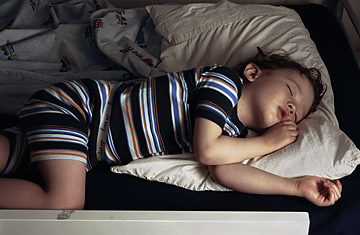
New lessons from 100 years of bedtime battles
(3 of 3)
None of this stops the 21st century descendants of 19th century scientists from issuing sleep guidelines of their own. According to the National Sleep Foundation in Arlington, Va., babies from 3 to 11 months should sleep for a daily total of 14 to 15 hours, and toddlers 1 to 3 years old should get 12 to 14 hours. Preschoolers need 11 to 13 hours, and elementary schoolers need 10 to 11. Older children and teens require a minimum of eight hours, which can come as a surprise to parents whose teens seem to sleep all the time. In fact, kids in that age group may simply be shifting their internal clocks, going to bed in the wee hours and getting up at noon. Most teens emerge from this vampiric stage none the worse for it, though parents should try to keep things from getting out of hand. "It's best to keep them in the proper time zone," says Mindell.
A final wild card in all discussions of sleep duration is the way guidelines change from country to country. Australian children, for example, sleep almost a full hour per day more than American kids, who sleep less than kids in nearly all other countries. And different cultures have different tolerances for sleepy children. In Japan it's more or less accepted that students sometimes doze off in class because they've stayed up late studying the night before.
The best advice for parents, as with so many things, is simply to know your kids. Observe their body clocks by noting how long they sleep on weekends and holidays when there's no need to get out of bed for school. Track their grades as they sleep more or less. And above all, try to stay calm. They do eventually go the, er, heck to sleep. Just never as easily as Mom or Dad would like.
